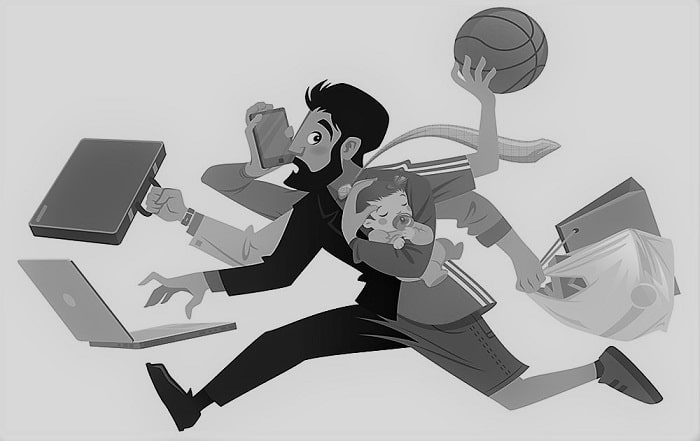Hypomania is a state of elevated mood which differs from a person’s normal mood. Hypomanic mood does not typically impair a person’s ability to function, but can alter a person’s behavior and interactions with others in both positive and negative ways.
This article is made to be used as an informational resource, not a diagnostic tool. If you or a loved one exhibits the signs and symptoms listed below, please seek professional advice. Do not attempt to self-diagnose or treat symptoms without the care of a medical professional.

Excessive multitasking is definitely a warning sign for hypomania.
What Is Hypomania?
The prefix “hypo” means “lower,” which can be slightly misleading. In this case, it means that a hypomanic state is less severe than a full manic episode, but the person’s overall mood is still higher than normal. Many people can experience hypomanic episodes as part of bipolar II or cyclothymia. However, hypomania is different from full mania in that it can occur on its own rather than as part of another disorder.
Some people experience increased productivity during a hypomanic episode, and others often greatly enjoy their company. But hypomanic episodes can also produce undesirable symptoms that impact a person’s quality of life.
Symptoms of Hypomania
Hypomanic episodes generally have at least three of the following symptoms over a period of at least four days:
- inflated sense of self-esteem;
- needing less sleep than usual to feel rested;
- talking more than usual;
- talking loudly or exhibiting “pressured speech” (rapid-fire, emphatic language that quickly changes from topic to topic; also known as “cluttered speech”);
- racing thoughts and being full of ideas;
- distractibility;
- agitation and irritability;
- engaging in risky behaviors that are not typical for the person, such as shopping sprees, impulsive business decisions, unsafe sex, etc.
Causes of Hypomania
The exact causes of hypomanic behavior are currently unknown. When occurring as part of a larger disorder such as bipolar II, genetic factors could play a contributing role. There has been some speculation that hypomanic behavior holds an evolutionary advantage and may become more common over generations. Environmental factors can also come into play. Research has shown that excessive caffeine intake, lack of sleep, and stressful or traumatic life events can all trigger a hypomanic episode. Some medications can also produce hypomanic symptoms as a side effect. In these instances, one can alleviate symptoms by simply adjusting the dosage of the medication.

Other Issues that Relate to Hypomania
Because risky behaviors can be a hallmark of hypomanic behavior, people can find themselves in undesirable situations. An increased sex drive can lead to indiscretions that the person would otherwise not participate in, potentially causing problems in friendships and romantic relationships. A person in a hypomanic state may be driven to spend money that he or she does not have, leading the person to incur unnecessary debt. In extreme cases, a hypomanic mood can drive a person to participate in unsafe behaviors such as drinking and driving or taking part in dangerous activities that he or she would not typically be drawn to.
Hypomania Treatment Options
Not all people need medical treatment for their hypomanic behaviors. To manage mild to moderate symptoms, one needs to employ a series of lifestyle changes such as eating a healthy diet, consuming regular meals, getting enough exercise, and making sure to get the right amount of sleep. For some, mild hypomanic symptoms can increase productivity, creativity, and energy, so treatment to avoid these symptoms may not be desirable or necessary as long as periods of depression or full mania don’t immediately follow these episodes.
When symptoms negatively impact a person’s life, patients can handle these symptoms with the same medications they have to manage the symptoms of full mania. While hypomanic episodes are not related to seizures, some anti-seizure medications have been shown to reduce symptoms. Some antipsychotics such as aripiprazole, cariprazine, quetiapine, asenapine, risperidone, and ziprasidone can be beneficial in treating hypomanic symptoms. Benzodiazepines can be useful for the short term management of undesirable symptoms such as insomnia and agitation.
Hypomania and Success
Because people with hypomanic symptoms tend to have racing thoughts, new ideas come easily to them, and their increased impulsivity leads them to act on their ideas more often than they would if they were not in a hypomanic state. They may not always succeed in every idea, but if a period of depression does not follow their hypomanic episode, they are more likely to try something new right away rather than wallowing in their failure. For some people with hypomanic symptoms, this can lead to bigger rates of success in business, technology, arts, and more.
Some of the most famous leaders in technology and business are believed to be hypomanic. In his book The Hypomanic Edge, psychiatrist Dr. John Gartner examines the lives of successful people throughout history and in our modern era from Christopher Columbus to Andrew Carnegie and more. He hypothesizes that many of these dynamic people had hypomanic symptoms. As reported in the New York Times, Boston polymath Laurence McKinney explained:
If you can focus this energy, you can do great things with it. If not, well, I think it can be difficult.

Thoughts So Far
Subjects that suffer from hypomania can manage their symptoms easily with a combination of lifestyle changes and medication when necessary. For some, channeling symptoms in a positive is also a way to enhance their career or social life. Do you or a loved one experience hypomanic episodes? How have these symptoms affected your life? Please share your experiences in the comments. Share this article on Facebook and Twitter to help spread awareness of this little known disorder.
Images taken from depositphotos.com.
